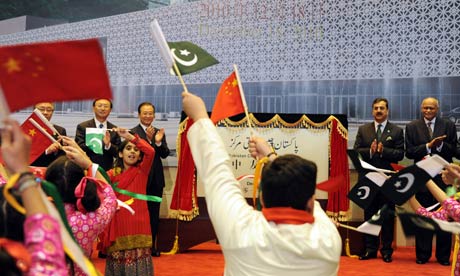
Chinese Premier Wen Jiabao and his Pakistani counterpart Yousaf Raza Gilani at the inauguration ceremony of the Pakistan-China Friendship Centre in Islamabad. Photograph: Aamir Qureshi/AFP
Amid parks and lakes on the outskirts of Islamabad sits the gleaming, three-storey Pakistan-China Friendship Centre. The centre, which cost an estimated £35m, houses an 800-seat auditorium, exhibition centre, dining facilities, conference rooms, banquet halls, dance and art facilities.
Inaugurated in December 2010 by the Chinese prime minister, Wen Jiabao, and Pakistan's prime minister, Yousaf Raza Gilani, the centre was a gift from the Chinese government and "symbolises the durable and resilient strategic relationship, which is today the cornerstone of both countries' foreign policies," according to Mushahid Hussein, the senator and former information minister who runs it.
But the building, one of the most impressive in Islamabad with its contemporary architecture fusing Chinese and Pakistani Islamic styles, has also come to symbolise all the problems of a relationship which, despite goodwill on both sides, remains complex. Municipal officials in the capital said they had difficulty paying the heavy maintenance costs of the building.
Pakistan, with its strategic position, natural resources and warm-water ports, has long been an ally of Beijing. The Chinese see the south Asian state, the closest they have to a friend both in south Asia and in the Islamic world, as important to the security and development of their western, predominantly Muslim provinces, and as a useful aide in efforts to counter the influence of India. In recent years, links have grown closer.
"The relationship is based on mutual respect and shared interest. Our economic interests converge and we both have very pressing unresolved territorial disputes with India," said Irfan Shazad of the Institute of Policy Studies in Islamabad.
In the 1990s China offered Pakistan aid with its nuclear programme and now appears ready to honour longstanding commitments to supply Pakistan with two new civilian nuclear reactors. As Islamabad's relations with Washington have soured, Beijing has also become Pakistan's main arms supplier, selling it missiles, tanks, jet fighters, radar equipment and submarines.
Then there are the infrastructure projects. These range from help with the financing and construction of a huge new port on Pakistan's southern coast, projects to improve the currently vulnerable road link than runs over the Himalayas, assistance with railways and enormous hydroelectric schemes such as the controversial dam being built in the foothills of the mountains near the disputed de facto border with India in Kashmir.
There is also straight humanitarian aid – such as during the recent devastating floods – and growing commercial and cultural ties.
"They are very big friends. They bring machinery and knowledge. They do things we couldn't do ourselves," said Faseih Iqbal, a senator from the southwestern state of Balochistan, where Chinese state-owned companies have invested massively in mining and smelting.
For Professor Maria Sultan, of the Islamabad-based South Asian Strategic Stability Institute, "Chinese economic diplomacy has been far more effective than American security diplomacy over recent years."
"All the schools in Sindh [Pakistan's large southern province] now teach Chinese as a second language. President [Asif Ali] Zardari has done more than 20 state visits all over China, more than to any other nation," she said.
Yet, despite the consensus in Pakistan and the official rhetoric of ties being "deeper than the seas and sweeter than honey", some analysts believe the two states' links are exaggerated.
"There is certainly a strong relationship but China increasingly has the same concerns and caveats in Pakistan as the US has," said Lisa Curtis, a senior research fellow at the Heritage Foundation in Washington. "So there are limits to how far the Chinese are prepared to bail Pakistan out economically and they definitely have their concerns about instability. They also want good returns on any commercial investments."
Bilateral trade between Pakistan and China last year was estimated to be around $9bn – a fraction of that between India and China – and Chinese investments in Pakistan were not more than $1.4bn. Beijing has also made clear its concerns about the spillover of Islamic extremism from Pakistan into China's restive southwest.
"If you scratch the surface and look at what is happening with the Chinese in Pakistan, it's a lot less than meets the eye," Curtis said.
During Pakistan's recent floods, Chinese aid totalled $18m; the US gave nearly $700m.
Many Pakistanis also complain about cheap Chinese goods flooding their markets or alleged corruption in government contracts such as that for locomotives signed with Chinese suppliers.
There are other ties that bind beyond the commercial however.
At a function held in Islamabad last month to launch a new magazine published by the Pakistan-China Friendship Centre, successive speakers from both nations spoke of the warmth of their mutual feelings. One quoted the work of American political scientist Samuel Huntingdon.
"Huntingdon said the coming clash will be between the western civilisation and the Islamic-Confucian civilisation. He was right," he said, to general applause.
source:guardian


0 comments:
Post a Comment